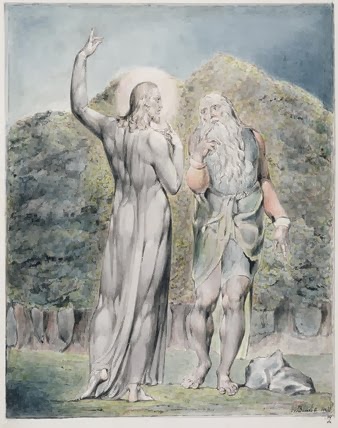February Trinity
(Sunday after Ash Wednesday)
Matthew 4:1-11
 |
| Tissot |
Then Jesus was led by the Spirit into the loneliness of the desert to experience the tempting power of the adversary.
After fasting forty days and nights, for the first time, He felt hunger for earthly nourishment. Then the tempter came to him and said, “If you are the Son of God, let these stones become bread through the power of your word.”
Jesus answered, “It is written, ‘The human being shall not live by bread alone; he lives by the creative power of every word that comes from the mouth of God.’”
Then the devil took him to the holy city and had him stand on the parapet of the temple. “If you are the Son of God,” he said, “throw yourself down. For it is written, ‘He will command his angels concerning you, and they will lift you up in their hands so that you will not strike your foot against a stone.’”
 |
| Blake |
Jesus answered him, “Do not put the Lord your God to the test.”
Again, a third time, the devil took him to a very elevated place and showed him all the kingdoms of the world and their splendor. “All this I will give to you,” he said, “if you will bow down and worship me as your Lord. “
Jesus said to him, “Away from me, Satan! For it is written, ‘You shall worship [pray to] God your Lord who guides you and serve him only.’”
Then the adversary left him, and he beheld again the angels as they came to bring him nourishment.
February/March Trinity
(Sunday after Ash Wednesday)
March 5, 2017
Matthew 4:1-11
 |
| Temptation in the Desert, Michael O'Brien |
One of the dictums of war is 'divide and conquer'. This method is used to maintain or gain power. In today's reading, the adversaries of humanity seem to recognize that someone has arrived on the field of battle who will be a threat to their power over humanity on earth. The tempter always tries to separate the human and earthly from the divine. The tempter's plan of divide and conquer has always been to get the human being to depend on, either totally him or herself, or on the nature of the earthly world.
Christ's visitations by the adversaries of humanity are archetypal for all human beings. We are all tempted to nourish our bodies and souls solely through earthly substances. We are all tempted to defy the laws of spirit and the laws of matter. We are all tempted to pay exclusive attention and devotion to earthly splendors.
Christ has shown us how to maintain our connection to the divine while on earth. We can recognize that it is God's own life force that keeps us alive, not just the earthly substance. We can humbly acknowledge that we are not above God's heavenly and earthly laws. We can recognize that the splendor of all earthly kingdoms belongs to God, who keeps all alive.
We ourselves conquer the adversary through gratitude and praise. In the words of the poet:
I praise my God, as every morning the sun awakens,
And I am grateful for all the wonders my eyes can see.
. . . I praise my God every morning as I awaken,
And give him thanks for every breath I’ve taken,
. . .
I praise my God when I look up and watch in wonder,
As every time I see the sky, with naked eyes,
I pray that I should be made worthy of his grace:
That when I look up to the ether clouds, I see his face…*
*Psalms of Praises by r. de cassia Canticle 2- I Praise my God, Zurielpress




